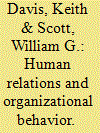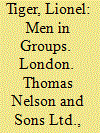|
|
|
Sort Order |
|
|
|
Items / Page
|
|
|
|
|
|
|
| Srl | Item |
| 1 |
ID:
030826


|
|
|
|
|
| Publication |
Oxford, Basil Blackwell, 1972.
|
| Description |
vi, 327p.
|
| Series |
Littlefield, Adams quality paperback; no. 269
|
| Standard Number |
0631142207
|
|
|
|
|
|
|
|
|
|
|
|
Copies: C:1/I:0,R:0,Q:0
Circulation
| Accession# | Call# | Current Location | Status | Policy | Location |
| 010521 | 302/HAR 010521 | Main | On Shelf | General | |
|
|
|
|
| 2 |
ID:
027469


|
|
|
|
|
| Publication |
New Jersey, Prentice-Hall Inc, 1971.
|
| Description |
xii, 241p.
|
|
|
|
|
|
|
|
|
|
|
|
Copies: C:1/I:0,R:0,Q:0
Circulation
| Accession# | Call# | Current Location | Status | Policy | Location |
| 006989 | 302/COF 006989 | Main | On Shelf | General | |
|
|
|
|
| 3 |
ID:
030877


|
|
|
|
|
| Edition |
3rd ed.
|
| Publication |
New York, McGraw-Hill Book Company, 1969.
|
| Description |
371pHbk
|
| Series |
Mc Graw series in management
|
|
|
|
|
|
|
|
|
|
|
|
Copies: C:1/I:0,R:0,Q:0
Circulation
| Accession# | Call# | Current Location | Status | Policy | Location |
| 007127 | 658.31244/DAV 007127 | Main | On Shelf | General | |
|
|
|
|
| 4 |
ID:
030511


|
|
|
|
|
| Publication |
DelhI, UBS PUblishers, 1974.
|
| Description |
xii, 315p
|
|
|
|
|
|
|
|
|
|
|
|
Copies: C:1/I:0,R:0,Q:0
Circulation
| Accession# | Call# | Current Location | Status | Policy | Location |
| 015404 | 302.50973/RIE 015404 | Main | On Shelf | General | |
|
|
|
|
| 5 |
ID:
024351


|
|
|
|
|
| Publication |
London, Thomas Nelson and Sons Ltd., 1969.
|
| Description |
xviii, 254p.Hbk
|
| Standard Number |
17138007X
|
|
|
|
|
|
|
|
|
|
|
|
Copies: C:1/I:0,R:0,Q:0
Circulation
| Accession# | Call# | Current Location | Status | Policy | Location |
| 002516 | 658.3/TIG 002516 | Main | On Shelf | General | |
|
|
|
|
| 6 |
ID:
087174


|
|
|
|
|
| Publication |
2009.
|
| Summary/Abstract |
Trends in intra-family relationships in Iran point to fast changes in regional and class-linked cultural patterns following the rapid spread of the national culture and of modernist ideologies and practices. People redefine their responsibilities and expectations as small nuclear families increase, women aspire to higher education and employment, and the bad economic situation necessitates various adaptations. Analysis of recent ethnographic data suggests that the shift from traditional authoritarian intra-family relations to relationships based on autonomy, individuation, independence and companionship creates new intimacies but also conflicts. The prevailing ideology of "progress" in Iran likely will further weaken patrilineal ties and kin relations while strengthening ties based on friendship and collegiality.
|
|
|
|
|
|
|
|
|
|
|
|
|
|
|
|
| 7 |
ID:
051030


|
|
|
|
|
| Publication |
Berkeley, University of California Press, 2001.
|
| Description |
viii, 294p.
|
| Standard Number |
0520223292
|
|
|
|
|
|
|
|
|
|
|
|
Copies: C:1/I:0,R:0,Q:0
Circulation
| Accession# | Call# | Current Location | Status | Policy | Location |
| 047978 | 303.6/DAS 047978 | Main | On Shelf | General | |
|
|
|
|
| 8 |
ID:
040953


|
|
|
|
|
| Publication |
New York, Holt, Rinehart and Winston, 1964.
|
|
|
|
|
|
|
|
|
|
|
|
Copies: C:1/I:0,R:0,Q:0
Circulation
| Accession# | Call# | Current Location | Status | Policy | Location |
| 002411 | 658.31244/DAI 002411 | Main | On Shelf | General | |
|
|
|
|
| 9 |
ID:
125220


|
|
|
|
|
| Publication |
London, Abacus, 2013.
|
| Description |
279p.Pbk
|
| Standard Number |
9780349113463
|
|
|
|
|
|
|
|
|
|
|
|
Copies: C:1/I:0,R:0,Q:0
Circulation
| Accession# | Call# | Current Location | Status | Policy | Location |
| 057519 | 302/GLA 057519 | Main | On Shelf | General | |
|
|
|
|
| 10 |
ID:
079752


|
|
|
|
|
| Publication |
London, Routledge, 2008.
|
| Description |
x, 242p.
|
| Standard Number |
9780415369114
|
|
|
|
|
|
|
|
|
|
|
|
Copies: C:1/I:0,R:0,Q:0
Circulation
| Accession# | Call# | Current Location | Status | Policy | Location |
| 052879 | 303.601/JAC 052879 | Main | On Shelf | General | |
|
|
|
|
| 11 |
ID:
181536


|
|
|
|
|
| Summary/Abstract |
International Relations scholars and practitioners commonly agree that relationships in world politics are managed impersonally. Personal connections between agents of states are perceived as having only little impact on foreign policy of states. The current article challenges this impersonal ethos, suggesting that personal relationships play an important role in conducting, and thus understanding, interstate relations. Interviews conducted with 21 senior Israeli officials concerning mundane professional practices reveal three elements that are essential for successful statecraft: acknowledging the power of interpersonal relations; substantive knowledge of counterparts; and the excellent communicative competencies needed to realize the potential of personal connections. We argue that statespersons’ behavior can be located on an impersonal-interpersonal continuum. Furthermore, we suggest explanations for deviations from the impersonal ethos and discuss the role of interpersonal practices in managing interstate relations. At the very least, the personal aspect should be taken into consideration when examining foreign policy. However, personal relations may have a highly significant impact on interstate interactions, thus requiring a revision of the current paradigm in IR, which marginalizes the personal aspect.
|
|
|
|
|
|
|
|
|
|
|
|
|
|
|
|
|
|
|
|
|